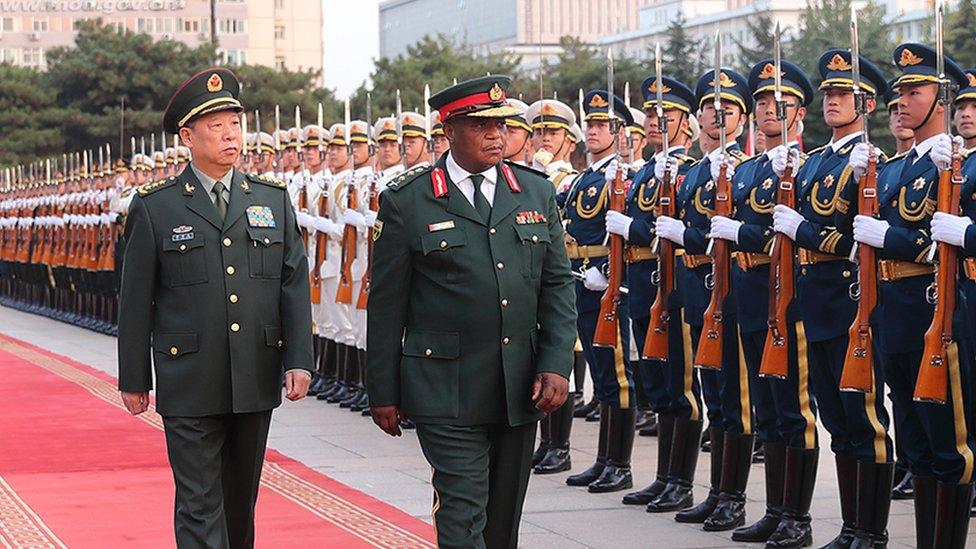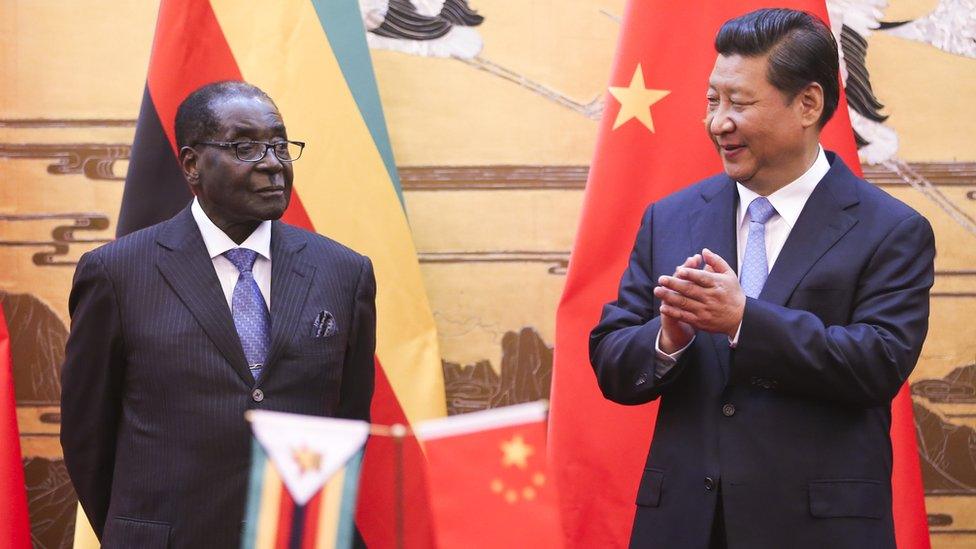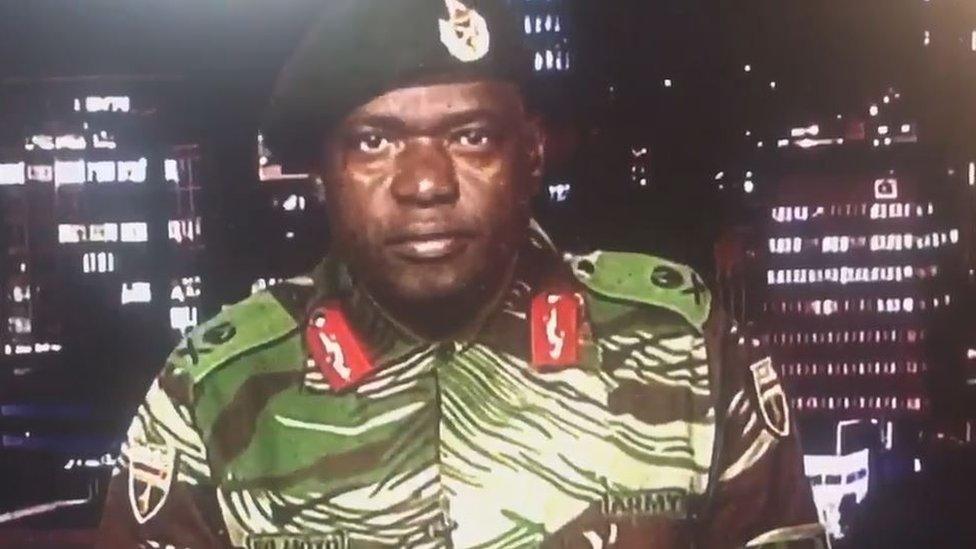What is the extent of China's influence in Zimbabwe?
- Published

General Chiwenga was welcomed to China by military leaders
A trip to Beijing by Zimbabwe's military chief was a "normal military exchange", China's foreign ministry said after the army seized power in Harare. How deep are relations between China and Zimbabwe really?
The news that General Constantino Chiwenga had visited China only a few days before the military takeover in Zimbabwe was a coincidence that did not go unnoticed.
There was also speculation after China said it was closely watching developments, but stopped short of condemning President Mugabe's apparent removal from power.
China is Zimbabwe's fourth largest trading partner and its largest source of investment - with stakes worth many billions of pounds in everything from agriculture to construction.
Zimbabwe is the dependent partner - with China providing the largest market for its exports and much needed support to its fragile economy.
China's relations with Zimbabwe are deep, starting during the Rhodesian Bush War.
Robert Mugabe failed in 1979 to get Soviet backing, so turned to China, which provided his guerrilla fighters with weapons and training.
Both countries formally established diplomatic relations at Zimbabwean independence in 1980 and Robert Mugabe visited Beijing as prime minister the following year.
He has been a regular visitor since.

Zimbabwean President Robert Mugabe has met Chinese leaders a number of times
For years, Zimbabwe's officials have tried to play off China against the West, advocating the country's "Look East" strategy, particularly following the introduction of EU sanctions in 2002.
Indeed, a decade ago, Mr Mugabe told a packed rally at the Chinese-built national sports stadium in Harare: 'We have turned east, where the sun rises, and given our back to the west, where the sun sets."
China's military engagement also deepened during Zimbabwe's "Look East" era.
Significant purchases were made, including Hongdu JL-8 jet aircraft, JF-17 Thunder fighter aircraft, vehicles, radar and weapons.
However, following a controversy about a shipment of arms in 2008, external, Beijing decided to list Zimbabwe for "limited level" military trading.
Despite Zimbabwe's efforts, the "Look East" strategy did not bring the investment flood hoped for and a decade later, in August 2015, Mr Mugabe openly asked for Western re-engagement in his "state of the nation" address.
Now, the reality is that increasingly Chinese and Western interests - particularly those of the UK - have become aligned.
Not far from each other in the outer suburbs of Harare, two of the biggest embassies in Zimbabwe are the British and the Chinese.
As other embassies scaled down or closed, Beijing's expanded.
Whereas British diplomats were well connected with business, civil society and opposition figures, the Chinese invested in "technical support" of the party of government Zanu-PF, including state security and the presidency.
When it came to Zanu-PF politics and factionalism, Chinese diplomats were well connected and insightful and, like their Western colleagues, concerned about stability, a better investment climate and adherence to the rule of law.
President Xi Jinping visited Zimbabwe in 2015 and President Mugabe visited Beijing in January 2017.
In public, the Chinese leader said his country is willing to encourage capable companies to invest in Zimbabwe.
But in private, the message was that there would be no more loans until Zimbabwe stabilised its economy.

Maj Gen Sibusiso Moyo said the military was not staging a coup
In 2016 trade between the two countries amounted to $1.1bn (£0.8bn), with China the biggest buyer of Zimbabwean tobacco and also importing cotton and various minerals.
In return Zimbabwe imported electronics, clothing and other finished products.
Chinese state construction firms have also been active, building infrastructure including Zimbabwe's $100m (£75m) National Defence College.
And last year China agreed to finance a new 650-seat parliament in Harare.
But Chinese diplomats and many businesses are waiting for better days in Zimbabwe.
Some companies have found the investment climate challenging - being burned on diamonds, for example - and have looked for alternative markets.
A couple of weeks ago I was in China, attending a meeting on China-Africa relations and Zimbabwe was not mentioned once.
Unlike Ethiopia, Sudan, or Angola that are strategic partners, or big markets like Nigeria, Kenya and South Africa, Zimbabwe is far from being Beijing's new priority.
So, Beijing's interest is in a better investment climate in Zimbabwe.
A clear transitional arrangement resulting in elections for a legitimate government in Harare is as much in Beijing's interest as London's.
The "Look East" and the "Re-engagement with the West" strategies have not brought about the confidence and investment that Zimbabwe needs.
What Zimbabwe requires is stable and accountable government - then investors from Asia, America and Europe will seriously consider that Zimbabwe has an investment future.
This was the message that Mr Mugabe received in Beijing in January.
And the one which Zimbabwe's military chief also was given last week.

About this piece
This analysis piece was commissioned by the BBC from an expert working for an outside organisation.
Dr Alex Vines OBE, external is Head of Africa Programme, Chatham House, and a Senior Lecturer at Coventry University.
Chatham House, the Royal Institute of International Affairs, external, describes itself as an independent policy institute helping to build a sustainably secure, prosperous and just world.

Edited by Duncan Walker
